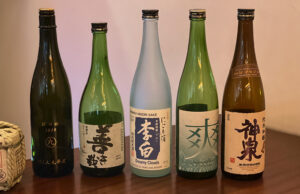Junmai Daiginjō
Japanese sake can be impressive flavor wonders. In order to distinguish between the different sake classes, the differentiation by Sake category meaningful. Junmai Daiginjō (純米大吟醸) is one of the two Sake types of höchsten premium category.
What does Junmai Daiginjō mean?
The "Dai" (大) at the beginning of the second part of the name of this quality grade means "big".
So while the middle level with Ginjō means "particularly carefully fermented", we have to do here with the "Great Ginjō". Translated, the complete name Junmai Daiginjō then means something like "made of pure rice and fermented with very great care".
What criteria must a Junmai Daiginjō sake meet?
To achieve this top quality, more than half of the rice is scraped off and fermented at low temperatures for long periods of time. Often 75 % or even more of the rice is polished away. The polishing process requires a great deal of skill and effort, and even the rice that has been shaved so small must be handled gently in the rest of the production process. Brewers must closely monitor each process without pause and work particularly carefully.
What does a Junmai Daiginjō sake taste like?
Junmai Daiginjō offers a refined taste of the concentrated flavor of rice. Particularly noteworthy is the balance between the distinct aroma and rich flavor.
Junmai Daiginjō should usually be served chilled (less often slightly warmed).
Junmai Daiginjō needs air and space. An airy glass or ceramic vessel is appropriate for this purpose. Many breweries recommend sommelier wine glasses as a suitable drinking vessel.
A Junmai Daiginjō is a special accompaniment from appetizer to main course.
Sharing pleasure in Japanese
SUSHIYA is passionate about Japanese cuisine and culture. In our restaurant sansaro you can encounter the fascinating Japanese cuisine or have it delivered to your home. On our homepage, Facebook and Instragram we always give insights into news and interesting topics.

Mini Sake Tasting March 17 2022
On March 17, we had the opportunity to celebrate the end of a day of workshops by a small but nice business group with a small,

Sake Tasting 29 May 2022
Outlook for the sake tasting on May 29, 2022 At the end of May we will again host a sake tasting, Sunday, 15.30h. Before Corona had

Review Sake Tasting with Food Pairing on May 1, 2018
Review of the sake tasting on May 1, 2018 at the sushi restaurant sansaro in Munich - where you can get to know Japanese sake and combine it with the right food.



